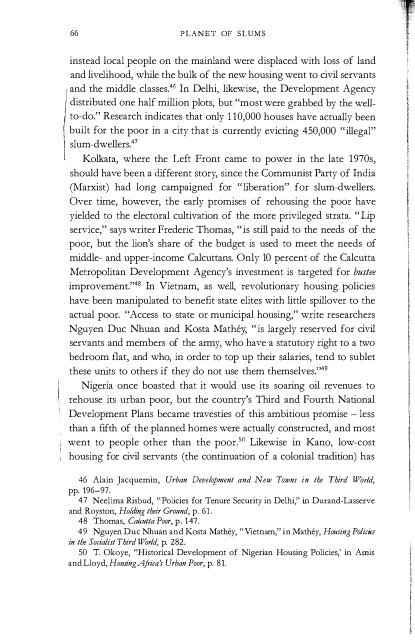Untitled - Rebel Studies Library
Untitled - Rebel Studies Library
Untitled - Rebel Studies Library
You also want an ePaper? Increase the reach of your titles
YUMPU automatically turns print PDFs into web optimized ePapers that Google loves.
I<br />
66 PLANET OF SLUMS<br />
instead local people on the mainland were displaced with loss of land<br />
and livelihood, while the bulk of the new housing went to civil servants<br />
and the middle classes.46 In Delhi, likewise, the Development Agency<br />
distributed one half million plots, but "most were grabbed by the well<br />
to-do." Research indicates that only 110,000 houses have actually been<br />
built for the poor in a city that is currently evicting 450,000 "illegal"<br />
slum-dwellers.47<br />
Kolkata, where the Left Front came to power in the late 1970s,<br />
should have been a different story, since the Communist Party of India<br />
(Marxist) had long campaigned for "liberation" for slum-dwellers.<br />
Over time, however, the early promises of rehousing the poor have<br />
yielded to the electoral cultivation of the more privileged strata. "Lip<br />
service," says writer Frederic Thomas, "is still paid to the needs of the<br />
poor, but the lion's share of the budget is used to meet the needs of<br />
middle- and upper-income Calcuttans. Only 10 percent of the Calcutta<br />
Metropolitan Development Agency's investment is targeted for bustee<br />
improvement."48 In Vietnam, as well, revolutionary housing policies<br />
have been manipulated to benefit state elites with little spillover to the<br />
actual poor. "Access to state or municipal housing," write researchers<br />
Nguyen Duc Nhuan and Kosta Mathey, "is largely reserved for civil<br />
servants and members of the army, who have a statutory right to a two<br />
bedroom flat, and who, in order to top up their salaries, tend to sublet<br />
these units to others if they do not use them themselves. ,, 49<br />
Nigeria once boasted that it would use its soaring oil revenues to<br />
rehouse its urban poor, but the country's Third and Fourth National<br />
Development Plans became travesties of this ambitious promise - less<br />
than a fifth of the planned homes were actually constructed, and most<br />
went to people other than the poor.50 Likewise in Kano, low-cost<br />
housing for civil servants (the continuation of a colonial tradition) has<br />
46 Alain Jacquemin, Urban Development and New Towns in the Third World,<br />
pp. 196-97.<br />
47 Neelima Risbud, "Policies for Tenure Security in Delhi;' in Durand-Lasserve<br />
and Royston, Holding their Ground, p. 61.<br />
48 Thomas, Calcutta Poor, p. 147.<br />
49 Nguyen Duc Nhuan and Kosta Mathey, "Vietnam," in Mathey, Housing Policies<br />
in the S otialist Third World, p. 282.<br />
50 T. Okoye, "Historical Development of Nigerian Housing Policies,' in Amis<br />
and Lloyd, Housing Afdca's Urban Poor, p. 81.<br />
THE TREASON OF THE STATE 67<br />
been appropriated by unentitled but politically powerful individuals with<br />
incomes high above the threshold set for eligibility. 51 Jamaica is another<br />
country where populist rhetoric has never been matched by deeds. To<br />
be sure, the National Housing Trust (NHT) has a relatively large asset<br />
base, but - as Thomas Klak and Marlene Smith emphasize - it does virtually<br />
everything except build for the poor. "Presently most of the<br />
NHT's funds go to meet its own payroll, help fulfill central government<br />
reserve requirements, provide interim financing of higher income and<br />
even non-NHT housing construction, and finance the mortgages of a<br />
relatively few and mostly higher-income contributors."52<br />
In Mexico, where during the 1980s the formal home market<br />
provided for little more than one-third of demand, housing is heavily<br />
subsidized for military families, civil servants, and members of a few<br />
powerful unions such as the oil workers, but the very poor receive only<br />
a trickle of state aid. Thus FOVI, the government trust fund serving<br />
the middle segment of the housing market (up to ten times minimum<br />
wage), mobilizes 50 percent of federal housing resources, while<br />
FONHAPO, serving the poorest segment, receives a mere 4 percent. 53<br />
John Betancur finds a similiar situation in Bogota, where middleincome<br />
groups receive generous subsidies while the state provides only<br />
grudging assistance to the housing needs of the poor. 54 In Lima,<br />
likewise, most public or subsidized housing is captured by middleincome<br />
groups and state employees. 55<br />
Urban elites and the middle classes in the Third World have also<br />
been extraordinarily successful in evading municipal taxation. "In most<br />
developing countries," the International Labour Organization's A.<br />
Oberai writes, "the revenue potential of real-estate taxation is not fully<br />
utilized. The existing systems tend to suffer from poor assessment<br />
51 H. Main, "Housing Problems and Squatting Solutions in Metropolitan Kano,"<br />
in Robert Potter and Ademola Salau (eds), Cities and Development in the Third World,<br />
London 1990, p 22.<br />
52 Thomas Klak and Marlene Smith, "The Political Economy of Formal Sector<br />
Housing Finance in Jamaica," in Datta and Jones, Housing and Finance in Developing<br />
Countries, p. 72.<br />
53 Pezzoli, "Mexico's Urban Housing Environments," p. 142.<br />
54 John Betancur, "Spontaneous Settlements in Colombia," in Aldrich and<br />
Sandhu, Housing the Urban Poor, p. 224.<br />
55 John Leonard, "Lima: City Profile," Cities 17:6 (2000), p. 437.


